Paul E. Fallon's Blog, page 24
February 3, 2021
Everyone’s a Little Bit Nazi
When this ‘Lefties are Nazi’s’ post appeared on my Facebook wall, I realized that extreme labels, stripped of their actual definition, retain only the power to divide and offend. I cannot provide any reasoning to this conflagration of errant history and twisted tongue. Instead, I offer this parody, based on “Everyone’s a Little Bit Racist,” from Avenue Q. Enjoy!

(Note: I posted an audio/video link of the parody on You Tube, which was removed for violating hate speech. Such is fate when humorless algorithms determine content. I appealed the removal, so perhaps my rendition will see the light. Still, I suppose a song that promotes communication and love actually does violate the ‘community standards’ under which we live these days. In the meantime, if you would like to ‘hear’ the song, let me know and I forward the .mp3 file.)
Everyone’s a Little Bit Nazi
——
Everyone’s a little bit Nazi, its true
Even though we wrap our hatred in red white and blue
Look around and you will find
People crushing each other’s spine
To climb to the top of the higher-archy
To take all the goodies I can get for me.
——
Everyone’s a little bit Nazi, don’t you see
Pundits on the left just cancel anything they disagree…with
No racial jokes, no ethnic slurs
Every gender pronoun mistake deserves
A damning rant on your Facebook wall
To prove you’re the most woke bloke of all.
——
Everyone’s a little bit Nazi, I know
People on the right, their skin’s so white it glows
God and guns and traditions endure
To maintain a nation that’s pure
But if you betray one shadow of doubt
They will quickly snuff you out.
——
Everyone’s a little bit Nazi, today
But no will admit they’re Nazi, no way
When we spew that label of hate
We lose our chance to communicate
It’s easier to inflict that word
Then actually let someone be heard.
——
And listen. And be heard…in return.
——
Everyone’s a little bit Nazi, in our land
Everyone’s afraid to reach out…or up…or down…or over…and take someone’s hand
But one thing I know for certain.
Folks screaming ‘Nazi!’ are the one’s most hurtin’
So if someone throws slander at you
Take a moment to admit: ‘it’s a tiny bit true’
Then turn the tables and try to hear
The cry of person who’s lost in fear
Dominance is wired in our DNA
Doesn’t mean we have to act that way
Don’t forget the crimes of the Nazi regime
Or trivialize them to a meme
Consciously we can rise above
And choose to act in the spirit of love
——
Everyone’s a little bit Nazi. Just sayin’
January 27, 2021
Come for the Activism; Stay for the Art

Steve McQueen. Not the bad-boy race car driver from The Great Escape, idolized by all guys over sixty for nabbing Ali MacGraw. The other Steve McQueen (officially Sir Steven Rodney McQueen CBE). The twenty-first century British filmmaker of Grenadian and Trinidadian descent who’s the polar opposite of last millennium Steve. Where American Steve McQueen is all frenzied pursuit, British Steve McQueen delivers deep stillness. His camera sits patient, documenting a passive black face so long, the inner rage rises through the skin and pierces our soul.
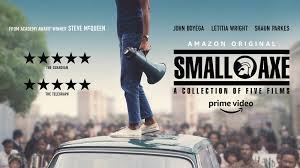
It was a no-brainer for me to hit ‘Play’ on Small Axe, Steve McQueen’s quintet of films about Caribbean immigrants in London during the 60’s and 70’s. The series got great reviews and aligns with my current anything-but-white-guy media jag. In the evening, my eyes are too tired for serious reading. I just want to watch.

Episode One, Mangrove, based on the real events of London police harassing a Trinidadian man uppity enough to open a restaurant in Notting Hill in the late 1960’s, is a full feature film. The riveting drama culminates in court room tension that feels both more genuine and more unsettling than Netflix’s recent The Trial of the Chicago 7. Devoid of Aaron Sorkin’s polished Hollywood, Mangrove is more authentic. Yet the scene that resonated in my head the following morning was a lingering image of restaurant debris, strewn across a floor beneath the soundtrack of a police raid. Mr. McQueen does not always show the violence. He makes us feel it.
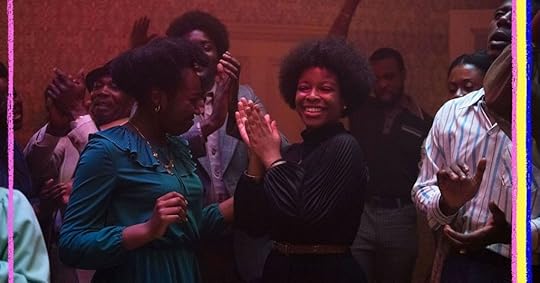
Fearing more angina, I waited a few days before I attempted the second film, Lover’s Rock. No need for such worry. This delightful, affective film follows several loose stories about preparations and enactment of a house dance party in the 1970’s. The sound track is amazing, the camera work perfectly jittery. We are at the dance; from awkward first steps to joyous frenzy to tedious exhaustion. The young lovers who meet within the soundtrack are poignant and potentially tragic as any Romeo and Juliet. And though the reality of threats from within and without—sexual predators and thugs down the block—are never far away, the film has a rosy luster that speaks to every individual’s search for respite, for joy.
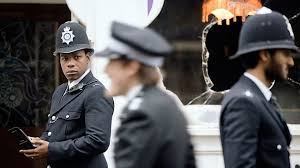
Red, White, and Blue. Back to a plot based on a true story: a Black police officer’s desire to reform the London Metropolitan Police from within, even as he suffers a father’s wrath and his community’s rejection for signing up with the enemy. Four hours into Small Axe I’m guilt-stricken by the sick consolation that the United States is not the only homeland of racial hatred, discrimination, and violence. Brutal systems of racial injustice exist everywhere. But Steve McQueen makes them real, personal, in his constant close-ups. Officer Leroy Logan’s matte, dark chocolate skin absorbs light, sucks us into his isolation. While his father’s lacquered black complexion refracts his anger at the endless oppression like a light saber brandished at warp speed.
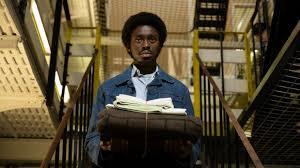
Alex Wheatle picks up where Officer Logan left off: a young Black man entering prison. But the story of a total orphan abused by the supposed benevolent social system takes a welcome, positive spin. Perhaps because Mr. McQueen believes in the transformative power of Rastafarian, perhaps because hope wins out in the end, perhaps because this too, is based on a true story, which has a happy ending.
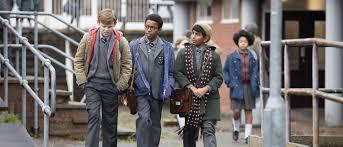
By now I realize that the films after Mangrove, are quite different than the initial offering. Shorter, more particular slices of life in Black London. The final film, Education, is similar in length and scope to two, three, and four. It’s also based on real events: an unofficial policy within London schools to transfer disproportionate numbers to Black students to ‘sub-normal’ schools. However, the plot and characters were created in service to the message, and the result is a bit preachy, almost documentary in style. Although I hear the message, Education does not rouse the empathic anger the other films evoke. Yet once again, Mr. McQueen’s most profound messaging comes from his camera’s stillness. The slow pan of a classroom of ‘sub-normal’ students: some jittery; some passive; our hero Kingsley bored to fatigue; while a pathetically useless teacher strums and drones a tortured version of ‘House of the Rising Sun.’ It’s an excruciating scene, minutes long. As the teacher warbles verse after verse of a song we all know, I found myself counting toward the end, wanting it to be over, yet unable to stop watching the tedious visualization of human potential lost. When the song finally comes to the end, and I breath a first sigh of relief, the teacher starts all over again. I gasp at the prospect of enduring it all again. While the children, unperturbed by this peculiar torture, submit in order to survive.
Watch Small Axe. All of the films. In order. Watch how human potential can be crushed. See it thrive anew.

January 20, 2021
On the Inauguration of ’46: Heeding the Words of ‘2

“Nip the shoots of arbitrary power in the bud, is the only maxim which can ever preserve the liberties of any people.”
On this day of our nation’s rockiest Presidential Inauguration, I turn my thoughts to John Adams.
“Power always thinks it has a great soul and vast views beyond the comprehension of the weak; and that it is doing God’s service when it is violating all his laws.”
George Washington served as our first President for eight years, so popular he could have continued on forever, yet he established the precedent of two terms and a graceful hand-off to his Vice-President. Four years after the first Number Two became the second Number One, John Adams had a far more distasteful task: to turn over the reins of an office he fought for and desired to his bitterest opponent: Thomas Jefferson.
“The only maxim of a free government ought to be to trust no man living with power to endanger the public liberty.”
If John Adams had a seditious bone in his body, he might have scripted an early version of ‘45’s playbook. Thankfully for us, he did not. In 1801, conducting a peaceful transition of power between ideological opposites was truly revolutionary.
“Power always sincerely, conscientiously…believes itself right. Power always thinks it has a great soul and vast views, beyond the comprehension of the weak.”
Among our Founding Fathers, John Adams cuts a peculiar figure. Short and stout, overbearing and righteous. (Adams bowed to Jefferson becoming President, but he did not attend the Inauguration and the two men remained bitter rivals. Adams’ last words are reported to be, “Thomas Jefferson survives,” when in fact, both men died on the same day, July 4, 1826.) Adams was unemotional, rational beyond bending, yet as devoted to his wife Abigail and their children as to his pursuit of freedom. One of the least wealthy Founding Fathers, John Adams lived a life of equality (he was an abolitionist who never owned slaves) even as his Federalist leanings and distrust of majority whim make him a potential poster child of today’s educated elite.
“Because power corrupts, society’s demands for moral authority and character increase as the importance of the position increases.”
Yet in the ribald election of 1800, wealthy, slave-owning Jefferson successfully portrayed himself as the champion of the little man. Perhaps the earliest example of American voters selecting a leader based on what he says, rather than what he does.
“Power must never be trusted without a check.”
So today, as Joe Biden becomes our 46th President despite ten weeks of false claims of election fraud, an attempted judicial coup, and violent sedition, let us give thanks to John Adams for his courage and humility. To turn power over to a rival because we are:
“A government of laws, and not of men.”
January 13, 2021
Sons of Liberty
September 10, 2020
Cambridge, MA

A chilly drizzle sprinkles discomfort over our Black Lives Matter evening vigil. The number of people taking a knee since late May has shriveled to five. My meditation wanders from the horror of Officer Derek Chauvin’s knee pinching George Floyd’s neck to whether—or why—we should keep this going. Gone are the halcyon summer days with dozens of kneelers, a parade of encouraging car horns, accolades from people of color, spontaneous applause. Summer’s collective energy has morphed into quiet persistence. The few souls who remain have incorporated 8:46 of public silence into our daily routine.
Our vigil might be the smallest in the Boston area, but it also might be the longest lasting. We bear witness every night. Because keeping injustice in the public eye is one small compass point in the spectrum of change. We don’t know which passersby we might influence. We are not supposed to know. We witness because it is the right thing for us to do. For our own fortitude. And because we trust that seeds of change germinate from bearing witness.
An elderly couple, a female couple, and me. All regulars. Not exactly friends, though each night our after-vigil conversations (masked and socially distanced) grow longer, more personal. During a pandemic in which prudence requires we remain apart from most everyone, I welcome our shared meditation, our after-knee encouragements. I doubt I would kneel alone, but as long as one or more neighbors come to the guardrail, I will join them.

A pick-up truck stops along the curb: very big; very new. It’s not uncommon for people to pull over; the odd intersection of one-ways where Huron Ave meets Fountain Terrace requires some people to double check reference points. The driver rolls down his window. Also not uncommon. People sometimes feel the need to talk with us, though we generally remain silent in response. He unloads venom in words I don’t print in this blog. Unusual, but not unique. Hecklers are emboldened when our numbers are small and their vehicles so protective. We don’t enjoy being yelled at, but there’s no actual threat. The driver remains in his seat of horsepower, and as soon as my timer sounds, 8:46 complete, he revs away.
I watch him roar off and I ponder our futile non-interaction. What if the driver remained? What if we talked? Really talked. Could we transcend our stereotypical roles of affluent elite and angry young man? Is there any connection, however slender, to begin to bridge the chasm between us?
That event actually happened. And it inspired me to conceive a different ending. To prompt the kneeler to speak up. To prompt the heckler out of his truck. To sit them down on a porch and drink a few beers. To stop seeing each other as ideological opposites, but as actual human beings. To seek out common ground.

The result is Sons of Liberty, an 80-minute, adult-themed, two-person play that takes place on a front porch in real time. Peter, an intellectually obtuse engineer, cajoles reluctant Daryl, an army vet and postal carrier, to his porch. They exchange predictable tropes of right versus left, educated elite versus working class bloke, until commonalities—the New England Patriots, the residue of divorce—scratch their antitheses. As their conversation ranges from political rant to personal revelation, the men oscillate between mutual distrust and reluctant acknowledgement. Their connection fuses when they discover related heroes. Daryl is a Revolutionary War reenactor in the thrall of fiery Sam Adams, while Peter is a student of Samuel’s hyper-rational cousin, John. The ability of two Founding Fathers with such disparate temperaments to collaborate toward a shared objective offers guidance for these two men to become, if not quite friends, mutually respectful citizens.
Since September 10, I have written several drafts of Sons of Liberty, workshopped the play with two sets of Boston-area actors, and shared it with a number of local and national theater groups. I am currently seeking opportunities for virtual readings or workshops, with an eye toward an actual live staging (someday soon?). The script is available on the National New Play Network, though I am also happy to share a .pdf directly.
Please contact me if you’re interested in reading Sons of Liberty, or if you know anyone or any group that might be interested in developing this play, prescient to this moment in our history.
January 10, 2021
What We Allow, We Enable
This is the letter I sent to my Representative and Senators regarding the Capitol insurrection on January 6. Feel free to use any or all portions with which you concur in reaching out to your own elected officials.
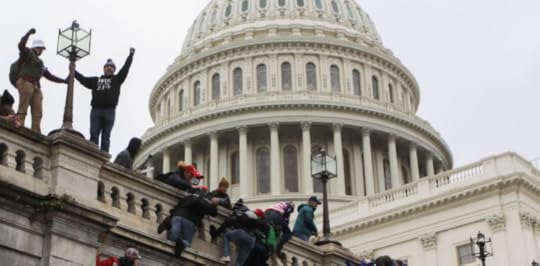
January 10, 2020
Dear Senators Markey and Warren,
Dear Representative Clark,
What we allow, we enable.
We allowed domestic terrorists to storm our Capitol. We allowed them to disrupt a peaceful government process. We allowed them to enter, deface, and ransack out nation’s most prominent public symbol.
It is only dumb luck for us that they were so disorganized. They had no real plan. The next time we allow such a breach, the terrorists may not be so aimless. Insurrection could result in actual coup.
Therefore, we must act now so we never enable them again. We must make clear—this week, before any subsequent events (already advertised for January 17) take place—that every person and organization involved in this terrorism will be dealt with to the fullest extent of the law:
1. Remove Donald Trump from office. He committed treason by inciting this violence. Voluntary resignation, the 25th Amendment, impeachment: whatever method is required.
2. Identify, arrest, and try to the fullest extent of law every person who forcibly entered the Capitol.
3. Identify every person from the Executive branch, member of Congress, elected official, self-appointed leader, financial supporter, and media influencer who championed this insurrection. Make public their involvement. Arrest and try to the fullest extent of law.
4. Formally censure all members of the House of Representatives and Senate who voted to sustain objections against the electoral college results, even after the insurrection was over and government resumed. They misused their power of this valid Constitutional check. Their ongoing insistence of unproven claims of election irregularity fuel further lawlessness. They are complicit in what happened, and will be complicit in any further illegal behavior.
5. Investigate why law enforcement branches frequently utilized to check large protests were ‘called off’ from this one. The scale and intent of this demonstration, turned insurrection, was well-advertised in advance, yet the law enforcement response was tepid. Any complaisance between an arm of law enforcement and these terrorists should be investigated, made public, and tried to the full extent of the law.
6. With regards to the Capitol Police, I suggest a different tact. Here we have an opportunity to move beyond public shaming and convicting insurgents. Here we have an opportunity to redefine policing that is strong yet just. Since the Capitol Police are part of the Federal Government, I suggest that Congress develop a model policing program, formulated to include the full range police tools with an emphasis on non-violent response, applied equitably across all citizens. I suggest that all current members of the Capitol Police be terminated, then given the option of reapply to the force, along with other citizens who demonstrate capacity to practice equitable policing. The reconstituted Capitol Police should be trained to protect our Capitol in a manner applied equally to all citizens, regardless of race, gender, economic strata, or political persuasion. It is important that citizens can convene at our Capitol, make their concerns known, and protest. It is equally important that no one be allowed to breach the Capitol and disrupt government process. The Capitol Police need to ensure and accommodate peaceful protest for all citizens, yet stand fast against anyone who attempts to invade. Recreating the Capitol Police is a perfectly scaled ‘pilot’ for overdue police reform throughout the nation. It could offer one positive result of January 6th’s seditious violence.
What we allow, we enable.
We must act now to make clear the violence of January 6 will not be tolerated. And then use the horror of that day to move from our current divisions toward our Founders’ vision: a more perfect union.
Thank you for your consideration. I look forward to your action on each of these six points.
Sincerely,
Paul E. Fallon
January 9, 2021
Ditties from the Info Desk: Seeking the Vaccine

A tall elderly man approaches the desk. Patrician in bearing, not a millimeter lost to the gravity of age.
“I’d like to find out how to get the vaccine.”
“Do you work at the hospital, sir?”
“No, but I’m seventy-five.”
“At this time, the hospital administers vaccines to health-care workers according to the governor’s priorities.”
“But I’d like to get one.”
“I suggest you review the guidelines to find your priority. Perhaps you can contact your physician.”
The gentleman gives me a look I’ve seen before, though usually from immigrants or non-English speakers, folks unfamiliar with American culture. A bafflement, an incomprehension of a world that mistreats him. He opens his mouth. I sense that he wants to protest, to argue, to have his way. But he can’t voice the injustice to me: another aging, albeit less distinguished looking, white guy. Besides, pubic displays of anger are likely not his style. The man turns and leaves. Withholding a polite, ‘thank you” is the extent of visible protest. But I feel his brain spin in disbelief. He is accustomed to being the first in line.
——————–
I staff the information desk at my local hospital a few days a week. The parade of people who enter a hospital provide fascinating glimpses into the vagaries of human experience. I occasionally share vignettes with my readers, stripped of identifying markers, which illustrate and sometimes delight.
January 6, 2021
Two Thumps Up: Rich Philanthropist
A Google Search for MacKenzie Scott yields the following headline:
MacKenzie Scott, Philanthropist and ex-wife of Jeff Bezos…
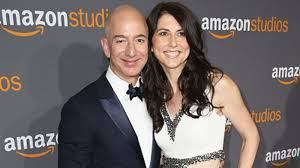
Two years ago, those among the general public who knew MacKenzie Scott (I did not) described her as Jeff Bezos’ wife. Then, in July 2019, she got a whopping $38.5 Billion from Mr. Bezos (4% of Amazon stock) in their divorce and she became famous as his savvy and wealthy ex-wife. During 2020 she gave away over $4 Billion to various charities. So now, the adjective ‘philanthropist’ gets plopped in front of Ms. MacKenzie’s name before the less flattering ‘ex-wife.’ And she’s still got a hefty $30 Billion to burn.
Ms. Scott has so much money, multiplying so fast (investing her divorce settlement in lowly US Treasuries would yield over $3 million a day) she cannot possibly spend it. In giving away an amount inconsequential to her—immense though it be to the rest of us—she buys something no piece of art or real estate can procure: fawning publicity with the noble adjective ‘philanthropist’ tacked in front of her name.
Ms. Scott does not have to give her money away. Neither does Bill Gates. Nor did John D. Rockefeller or Andrew Carnegie. But for each of these immensely wealthy people, giving away a proportion of their total wealth purchased them an inspiring legacy. More people know about Andrew Carnegie’s libraries than about the oppression and violence he foisted upon his steelworkers in Homestead, PA.
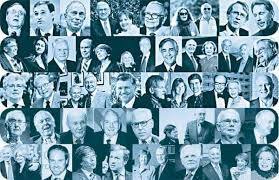
The United States’ social and economic system is riddled with oddities. We create tremendous wealth, and then distribute it erratically. We measure a person’s worth by the money they acquire, and then further lionize them if they give some away. Take a look at the Home page of The Giving Pledge. Headshots of billionaires, mostly white men, many with youngish wives at their sides. Their contributions may or may not improve the world. Their contributions will absolutely burnish their image.
Every person on this planet acts according to what they perceive to be their best interest. One measure of an individual’s wealth is the lens length of that interest. Poor, homeless, hungry people have a very short-term perspectives: they seek a hot meal and a place to sleep. People one paycheck away from eviction keep their eye on the job. Affluent people worry about their 401K’s and health care coverage. Billionaires worry about their legacy.
My problem with billionaire charity goes beyond whitewashing the actions that acquired wealth. It centers on the more fundamental issue: who gets to decide how we generate and allocate resources.

During my time in Haiti (a nation with the highest per capita ratio of NGO’s to citizens in the world) I witnessed the chaos of well-intentioned charity directed without broad perspective or local initiative. On the two projects I designed and helped construct, we used to joke, “Thank god we don’t have any Clinton-Bush funding,” It was well understood, on the ground in Haiti, that projects with such grandiose funding sources were bureaucratic entanglements, from which little money ever trickled all the way down.
I don’t know the social benefit that The Gates Foundation or Ms. Scott’s donations provide at the point of receipt. What I do know is that our society has ceded to Mr. Gates, Ms. Scott, and their ilk the privilege of shaping how we care for those in need simply because they are rich. Then we bestow upon them the cloak of generosity.
Instead of allowing the fabulously wealthy to create foundations that glorify themselves, we ought to make them pay more taxes, and collectively determine how to use that money to the betterment of humankind.
To be sure, that shift in wealth and responsibility requires drastic change in many attributes of society. It requires that we have a progressive tax structure as a fundamental method of income redistribution. It requires that restructuring not allow assets to flee beyond national boundaries. It requires that we collectively determine a minimum level of health, shelter, nutrition, and social benefit every person is entitled to receive simply for being here. And it requires a responsible, accountable government to provide those services, either directly or through fair contract. In short, it requires that we non-billionaires stop pretending that the rich will take care of the poor, and acknowledge that each of us is responsible for our fellow human beings.
Whew. That would be a lot of work. Especially in a society grown addicted to the notion of individual rights and allergic to collective responsibility. It’s easier to let philanthropic foundations tackle the issues they choose, pretend the super-rich have got the charity thing covered, and then laud their generosity.

Within the space of two years MacKenzie Scott has gone from being tech-wife to savvy divorcee, to icon of female empowerment, to philanthropist. That she landed $38.5 Billion in a divorce is merely an extension of the grotesque amount of money we allow a few people to make. (It’s not for me to monetize the agony of being married to Jeff Bezos, and the guy’s certainly got billions to give.) That Ms. Scott chooses to adorn her name with ‘philanthropist’ for what’s essentially chump change is such an obvious expenditure it’s hardly worth noting. What is interesting to me is that we allow it, we condone it, and we celebrate it.
Thumbs up, MacKenzie, for being rich. Double thumbs up for being a rich philanthropist.
December 30, 2020
Top Ten of 2020

2020! 364 days ago, I hoped this ocularly significant year would help the world see things straight. I was so, so wrong. Still, all was not lost. Consider this listicle of experiences that we never even considered, yet 2020 delivered

10. The aversion reflex. It is now socially acceptable, even commendable, to close your mouth and look away when passing someone on the sidewalk. How friendly!

9. The zig-zag. Of course, it’s better to simply cross to the other side of the street to avoid others, ricocheting like some toddler learning to navigate a first bicycle.

8. The moss munch. You know it’s time to change your mask when the inner lining turns all cotton-candy and infiltrates your mouth. Time for some entrepreneur developed flavored face masks.

7. Rules are for others. People at the hospital information desk yell at me why they’re special: exempt from wearing masks, demanding to eat in the cafeteria, insisting to visit contagious, vulnerable patients. Corollary: Rules are for losers. The most compliant people I encounter are low-level workers and people of color. The least compliant? Senior staff and white people. Just sayin.’

6. Walk, walk, walk. I have so much time on my hands I walk everywhere. 268 straight days over 10,000 steps. Will I be able to keep it up through the winter to reach a full year?

5. Zoom seminars are terrific. Without geographical constraint, I attend BLM meetings with Aware-LA was easily as SURJ Boston. Hear speakers from the National Constitution Center as easily as Cambridge Forum. Corollary: Zoom social events are terrible. Enough said.

4. Sanity is a basement workshop. So far I’ve made beehives, planters, protest signs, and shelves. Next up: a Little Free Library for my front yard.
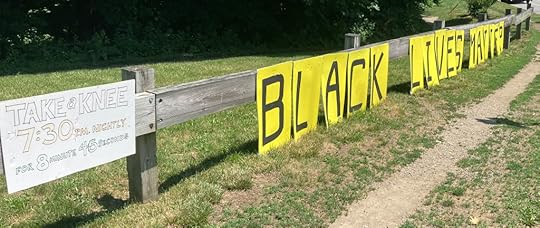
3. Take a Knee, meet your neighbor. Six months into our nightly vigil since George Floyd died, I am no better at meditating. But it’s important to me to bear witness, and I enjoy neighbors I had never met before.

2. Spider Solitaire. Totally addicted!

1. That’s all folks! This year has been such a downer, no way there are actually ten good things to say about it.
Here’s hoping health and contentment to all in 2021.

December 23, 2020
A Holiday Season of Circular Beliefs

I’m not a fan of Christmas. But in our culture it is unavoidable. So too, I’m not a fan of religion. But again, in our culture it is unavoidable. So despite my secular psyche, even I ponder the Great Almighty at this dark time of year. Not as one of the faithful, mind you. More like an anthropologist observing a curious species—believers—from a detached distance.
The most obvious bifurcation of my sixty-five years on this earth is that I spent the first half living as a straight man and the second half living as a gay man. Yet more profound than flipping my terms of sexual identification, has been my journey into spiritual dissonance. As the devout third son in an Irish-Catholic family, I was groomed for the priesthood. That I was clumsy, introverted, and laden with shame (see bifurcation listed above) made me, as a boy, eager to trod the road of God’s service.
Religion was the solace of my youth. God offered safe haven from a family and community more interested in mocking my peculiarities than acknowledging their strengths. I felt acutely alien at Christmas, when the message of love and goodwill bore no parallel in lived experience. Often, in December, I withdrew to the basement or my top bunk, where I drew my way to comfort. One year, I holed up for days and penned a twenty-foot-long banner of the Christmas story (Luke 2:8-14) in Gothic script and presented it to my aunt, the nun, who hung in it her convent chapel every Advent. The wider world interpreted that banner as a sign of piety and devotion. I knew it was simply an exercise in applying ink to assuage frayed holiday nerves.

I continued to be a good Catholic boy in the eyes of the world until an unexpected event occurred: I started to think. It’s a cliche to say that Catholicism thrives on the ignorant and uneducated, but it is so, so true. My independent mind budded in high school, when I argued that being a priest, albeit a valid vocation, was no more important than any other calling. My handlers weren’t too upset—men condemned to think could still be Jesuits—and everyone sang along as I strummed guitar at folk mass.
The cracks in my priestly veneer grew when I refused to apply to Notre Dame or Boston College, and went to MIT instead. The ‘reality’ of the Holy Trinity couldn’t hold a candle to mysteries revealed through biology, chemistry, physics, analysis and synthesis. I became a person of science. Which doesn’t negate the potentiality of a Supreme Being; it merely compromises religion’s stranglehold on the mind.
The Catholic Church made bald attempts to convert the secular woman I chose to marry, and failing that, laid claim to the religious upbringing of unborn children. In their greed for increasing numbers, they finally lost me. When a young man falls from ‘the one true religion,’ the pitch is steep. In short order I stopped going to confession, then mass, relegated god to a lower-case noun, renounced Rome’s repressive hierarchy, and let the actualities of the world I inhabit set my moral compass.

The further I distanced actual practice, the more intellectually interesting human interpretations of god became to me. I am not an atheist; the idea of something bigger than us seems both right and comforting. Nor I am against religion; I appreciate friends and family who find solace in whatever teachings they choose. I savor theological conversations with my Mormon brother as well as my Evangelical one, and find it ironic that they both talk with me, but won’t talk with each other. From my wide perspective, Mormonism and Evangelicalism are not all that different; whereas they view each other as heretics.
Which is where my fascination with religion ends, and my problems with it flower. I’m fine with everyone believing whatever works for them; I am against any religion claiming a singular path to salvation. Which pretty much all of them do. Once a disciple feels compelled share their good news, whether through proselytizing, force of government edict, arrogance of crusade, or crime of genocide; religion steps over the line from benevolent coping skill to a rationale for abuse.
Ultimately, humankind will be better off without religion because religions always step over that line. True believers are never content to simply savor their theology. They compel others to believe, and then fight to enforce their doctrine. Diplomacy, negotiation, have no bearing in a religious worldview because religion is not based on reason. It is based on faith. And faith is circular. Belief=truth. Parting the sea, rising from the dead, angels in upstate New York. Every religion’s origin story is sacred truth to its adherents, and pretty far-fetched to everybody else.

Circles are geometry’s most complete and stable form. A circle of belief contains a comprehensive worldview. It answers all questions, soothes all doubts. Provides purpose, meaning, and the comfort of others with like mind. I can still the conjure the security the Catholic Church provided this lonely boy, and witness today the solace it offers people like my brothers.
Circles are also geometry’s most restrictive form. Difficult to expand, contract, or escape. It takes tremendous energy to spin away from their centrifugal grip. But once you’re released, a free-radical twittering through space, liberated to observe the world unrestrained, with equally grave concern and detached amusement, one is disinclined to ever infiltrate any religious circle again.
I hope you all enjoy this season of long nights in a warm house with a good book (or a subscription to Netflix). If you inhabit a circle of belief that brings you comfort, savor it. And please remember that goodwill toward men doesn’t depend on all men believing the same thing. It comes from granting each person the grace and latitude to their own beliefs.

December 16, 2020
Three Band-Aids + a Tourniquet – Part Three

A band-aid is a beautiful thing: sterile pad ample enough to cover over a wound and protect it from infection until it heals. A tourniquet is entirely different. A rag, a shirtsleeve, a whatever’s available to put pressure between a torn arm or leg and a person’s torso. A stopgap measure to staunch bleeding. An acknowledgement that conditions are grave and medical support remote. A gamble to buy time until the body can be tended, even at the increased risk of losing the limb.
In the first of this three-part post, The Awkward Poser made the case that the United States deserves a new, proscriptive Constitution, and then proposed to warm-up that process by reinvigorating the amendment process. The second post described three amendments to champion as band-aids: the ERA, the 28th, and uniform Federal elections. Today, I take on the electoral extremity in need of a tourniquet in our beleaguered Untied States: the Electoral College.
 Winners who lost: Jackson, Tilden, Cleveland, Gore, Clinton
Winners who lost: Jackson, Tilden, Cleveland, Gore, ClintonThe Electoral College is not the worst compromise in our Constitution (fractionalizing men as 3/5 deserves that honor), but it is one that plagues the twenty-first century. Five times, in over two hundred years, the man selected as President by the Electoral College lost the popular vote. Two of those elections occurred in this century, and in 2016 the Electoral College voted contrary to the popular wishes of the largest percentage of voters ever. (Hillary Clinton received 2.8 million more votes than Donald Trump.)
 Losers who won: JQ Adams, Hayes, Harrison, GW Bush, Trump
Losers who won: JQ Adams, Hayes, Harrison, GW Bush, TrumpToday, a voter from Wyoming has more than three times the influence in a Presidential election than a voter from California. Given the ongoing shift from rural America to urban America, and the demographic differences between people living in rural versus urban states, the disproportionate influence of rural white voters will only increase.
How can we level the Presidential electoral playing field? The obvious answer: to abolish the Electoral College and direct elect our President, is logistically impossible. Eliminating the Electoral College requires a Constitutional Amendment; Constitutional amendments require a minimum of ¾ of the states for ratification; and there are too many low-population states who enjoy an Electoral College advantage for that to happen without the kind of horse-trading that might occur at a full Constitutional Convention.
However, there are three possibilities short of that, any of which could lessen the Electoral College’s rural tilt.
One: Expand the House of Representatives
This is a feasible, but non-serious proposal. True, expanding the number of Congressional Representatives would tilt the Electoral College towards larger-population states. However, we hardly need more members of Congress feeding at the public trough with notable ineffectiveness.
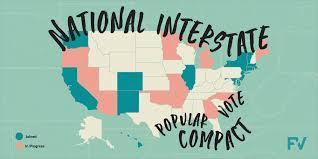
Two: National Popular Vote Bill
The National Popular Vote Bill states that the electors of a given state will vote for the winner of the national popular vote, even if that candidate did not win the majority of votes in that state. In theory, if states that cumulatively possess 270 electoral college votes pass the bill, this bill will ensure the winner of the popular vote becomes President.
At present, the bill has been presented in some form in all 50 states. It has passed into law in sixteen states with a total of 196 Electoral College votes (all of which, incidentally, voted for Biden in the 2020 election anyway).
This sounds like a great idea, but I have doubts. A state law is less fixed than a Constitutional Amendment. What if, say, Texas passes the law and in a future election the people of Texas majority vote for a different candidate than the national majority vote. And Texas’ 38 electoral votes will determine which candidate becomes President. What is there to stop the Texas legislature from rescinding that law between the election and the time the electors meet? As a Lone Star might say: darn little.
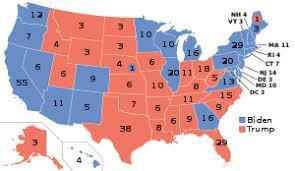
Three: Electoral College Proportional Voting
A third approach, and one I think most deserving, is for all states to adopt the Electoral College allocation used in Maine and Nebraska. At present, the election winner in 48 states gets 100% of that state’s Electoral College votes. That is not a Constitutional requirement; it is a state determination. However, in Maine and Nebraska, two Electoral College votes go to the candidate who wins the most vote in that state (i.e. the ‘Senate’ electors) while each additional vote is allocated according to the winner of each congressional district. This can result in a split Electoral College vote within the state. (In 2016, Clinton won Maine’s popular vote and the district that includes Portland, while Trump won the 2nd district, which covers primarily rural areas of the state. Clinton received three electoral votes, Trump one.)
What appeals to me about spreading this methodology across all states is not just that it decentralizes the Electoral College, but also that it would bring Presidential candidates into areas of the country where, right now, they never even campaign. No Presidential candidates ever come to my home state: reliably blue Massachusetts. The Democrats own us; the Republicans have no chance. But if the electoral vote from, say, the politically blended area around Worcester was up for grabs, it is likely that both Republican and Democratic candidates would make their way to that district to solicit that vote.
_____
To be sure, all of this is shenanigans against the obvious right thing to do: direct elect our President by popular vote, with a run-off if there is no majority victor. But as long as the Electoral College remains intact, or at least until a new Constitution is enacted, let’s put a tourniquet on a system that is bleeding the entire idea of democracy dry.



